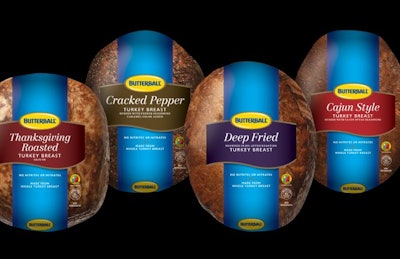
Seaboard Corporation reported another positive quarter for its investment in Butterball, reporting a $33 million income from affiliates for the third quarter of fiscal year 2022.
This income was a stark turnaround when compared to the $10 million loss reported during the third quarter of fiscal year 2021. It also indicates a trend of profitability after numerous consecutive quarters in which Seaboard faced losses on its investment on Butterball.
So far, Seaboard has turned a profit on Butterball for the first three quarters of FY 2022, and for the first nine months of the year its income from affiliates reached $60 million, versus a loss of $19 million for the first nine months of 2021.
The latest financial information was disclosed on November 1 securities filing. The third quarter ended on October 1.
“The increase in income from affiliates for the three-month period of 2022 compared to the same period in 2021 was primarily the result of higher selling prices due to product mix and grain-related mark-to-market derivative contract gains, partially offset by lower volumes of turkey products sold and higher feed costs,” the company said in its filing.
With momentum appearing to be on its side, Seaboard stated that it did expect Butterball to be profitable in the fourth quarter, which is already one third of the way completed. However, it did not offer any further guidance.
“Management is unable to predict market prices for turkey products or the cost of feed for future periods; however, management anticipates this segment will be profitable for the remainder of 2022,” the company stated.
Butterball is jointly owned between Seaboard Corporation and Goldsboro Milling, with Seaboard holding a 52.5% economic interest in the company.
Seaboard’s pork performance
While Seaboard reported gains in the turkey business, it experienced losses during the quarter in its pork business.
The Seaboard pork segment recorded a $51 million operating loss for the most recent quarter, versus an operating income of $52 million during the third quarter of FY 2021.
“The decrease for the three-month period primarily reflected lower margins on pork product and market hog sales due to higher costs of hogs, including an inventory adjustment, and higher feed and plant processing costs. During the third quarter of 2022, the pork segment recorded a lower of cost or market inventory valuation adjustment associated with a combination of factors, including the decline in quoted market hog prices and higher grain costs during the period,” the company stated.
Acquisition of hog farms
Seaboard also disclosed that its pork segment acquired hog farms in the central United States from The Maschhoffs for $58 million, enabling the company to increase its sow base and lessen its reliance on third-party hog suppliers. Of that $58 million, $9 million was for inventories, $45 million for property, plant and equipment, and $4 million to goodwill, which represents the assembled workforce and the benefits of acquiring an existing operation.















